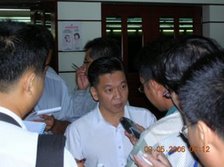“It’s my 44th birthday, where is my present?” Sarawak asked. Sarawak has been asking the same questioned since 16th September 1963 and no reply came from the federal government and through its cronies in the Sarawak government, the question has been depressed for the last 44 years.
As the BN government prepares to launch its 50th Merdeka, it forgot the history of the formation of the country, namely Malaysia, or else it should really celebrate our 44th birthday as a nation. History pointed out that the Malay Federation achieved its independent on the 31st of August 1957 without Sabah, Sarawak and Singapore.
Tunku Abdul Rahman then called for the formation of a bigger Malaya in Singapore in 1961, which eventually led to the formation of Malaysia. On the 16th September1963 Sarawak, Sabah, Singapore and the Malay Federation formed a new entity, and Malaysia was born. We did not join the Malay Federation and thus we are of equal partners on equal footing. However, it was not so as the federal treats Sarawak as the lesser brother and it has since been left far behind in term of development and opportunities. Let us take a comparison between Sarawak and the peninsular, nobody would question that we are some 20 years behind in term of development.
It is important to put history right on what was distorted by certain groups as history would put everything into the right prospective, including the Sarawak identity and what it truly deserve. Thus the question “where is my birthday present?” Some might ask, “why asking for the present?” The answer lies in the heart of most Sarawakian as we felt that we have been treated like the “adopted sons” and since we can’t demand and we can’t threaten, than at least we can beg or may be we even lost the right to beg?
Independence means more than shouting slogans or playing lips services and patriotism is more than flag waving on the street tonight or joins the parades at the Merdeka stadium. It means liberty to search for equal opportunity and happiness, freedom to speak out for our rights, daring to take the political reform necessary and equality for every Malaysian. Let all of us be the “prince” or “princess” of this land and let nobody subject to any kind of discrimination. All of us can play a part in taking this country to a greater height and let our Jalur Gemilang(national flag)fly high not only on the lamp post or poles or buildings but also in the heart of every Malaysian. Then everyone can truly shout “Merdeka! Merdeka! Merdeka!” from the bottom the heart and our forefathers will smile down on us.
David Wong on the eve of the 50th Merdeka
30-08-2007


